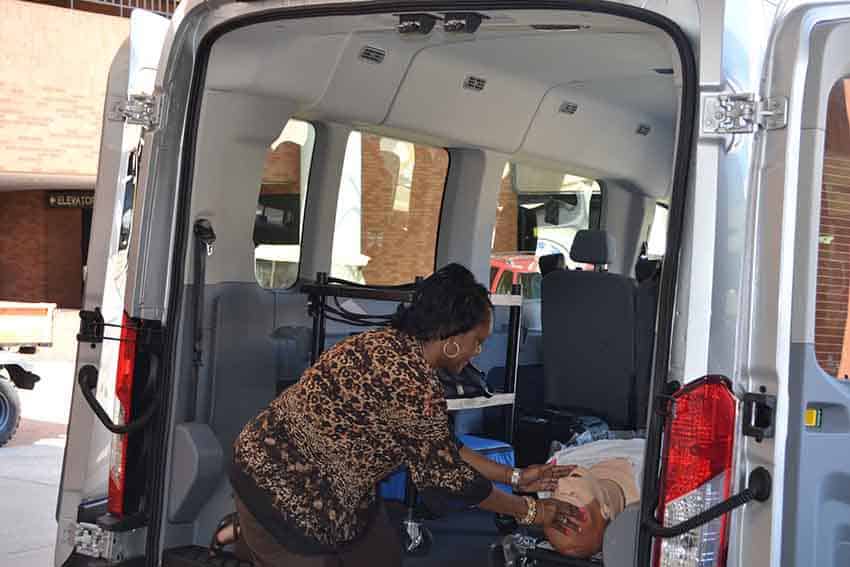Medical Training Using Simulation Technology Goes to Delta
| March 29, 2017 | Simulation education from UAMS is in a van that’s headed for the Arkansas Delta.
The Greater Delta Alliance for Health recently acquired and outfitted a new van packed with manikins and other equipment. The UAMS Centers for Simulation Education will use the van and the technology it will transport to teach nurses, physicians and the staff at hospitals in the region about a variety of situations. The instruction will cover birthing problems; trauma, such as tractor accidents; diabetic complications; pediatric emergencies; and stroke.

Straughter, right, watches as another Delta Leadership Institute member helps deliver a baby manikin as part of childbirth simulation. Birthing problems is one of the subjects simulation training in the Delta will address.
Medical simulation education uses people roleplaying as patients, human manikins equipped with sophisticated electronics, and animatronics and documents to act out clinical cases and scenarios for training health care students and professionals.
“Many Delta hospitals cannot afford to send nurses and doctors away,” said Mellie Bridewell, executive director of the Greater Delta Alliance for Health. “To bring that training onsite and collaborate with our emergency responders to put everything together in a team approach is just huge. We just don’t have the backup and often are using staffing agencies to fill in during training to get it, which is costing us a fortune.”
The Greater Delta Alliance for Health is a not-for-profit organization of 10 Arkansas Delta hospitals formed to establish and maintain current best medical practices and to better serve their Delta patients.
The van was purchased by the alliance and outfitted for about $48,000. In May 2016, the U.S. Department of Agriculture awarded a grant of $752,832 to the alliance, which is using $268,360 of those funds to contract with UAMS and its Centers for Simulation Education to educate rural hospitals in the Delta. Some of the remaining grant funds went to the purchase of training manikins and other simulation equipment.
“I think the exciting part for us is our simulation team is working with physicians at UAMS who already use our services to deliver it out to the Delta,” said Mary Cantrell, executive director of the UAMS Centers for Simulation Education. “We’re delivering things they have asked for. It’s a win-win all the way around.”
Travis Hill, director of simulation education for the Centers of Simulation Education, will be one of the medical educators traveling to provide training sessions. He said a van they had been using only had room for two trainers and one manikin with supporting equipment. The new van will enable them to transport four trainers, two manikins and more equipment. That added capacity in turn will allow the centers to offer two different training sessions in one visit; for example, one on trauma care and another on birthing problems
As of March, Hill said five sessions are scheduled so far and a total of 96 sessions planned to train 700-800 health professionals.
Bridewell doesn’t see any end to the need though, even when all those sessions are concluded.
“We have such turnover that we are constantly in need of accreditation and certification training,” she said. “So, I think the van will stay busy doing that.”
What simulation education offers nurses, physicians and other health professionals in Delta hospitals is experience. She said a single Delta hospital may only get a few trauma cases a year while an Emergency Department like the one at UAMS Medical Center may see several cases daily. Although distance education and traditional classroom instruction has value on its own, Bridewell said hands-on experience even through simulation with a manikin makes that education more practical and real.
Setting helps to make it real for the learners. Often the training can be done in the room where the care will happen and educators like Travis Hill and others from UAMS can provide advice to make sure those hospitals have what they need or make what they have function better.
The training provided by UAMS is a part of the alliance’s Arkansas Delta Health Education for Local Providers (HELP) Program. In 2016, the HELP program expanded to include on-site simulation training for rural health and hospital teams for obstetrical emergency situations.
